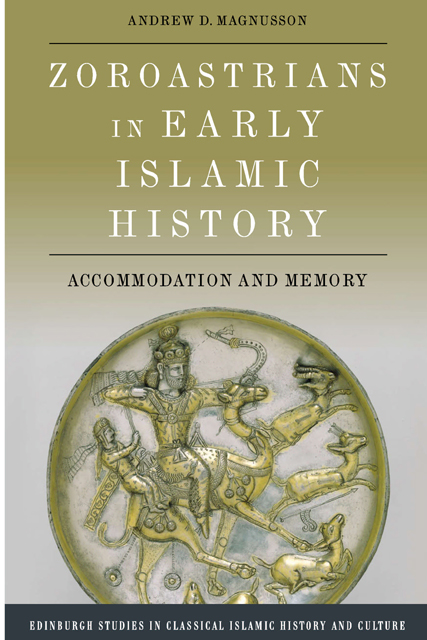Book contents
- Frontmatter
- Contents
- Acknowledgements
- A Note on Transliteration and Abbreviation
- Dedication
- Introduction: Zoroastrianism, Islam and Accommodation
- 1 Myth and Countermyth in Zoroastrian Historiography
- 2 Umar’s Dilemma: The Taxation of People Without a Book
- 3 Marriage, Meat and the Limits of Accommodation
- 4 Salman’s Charter as a Site of Memory
- 5 Fire Temple Desecration and Triumphal Tales of Violence
- 6 Rhetorical Zoroastrians in Early Islamic Discourse
- Conclusion: An Ambivalent Accommodation
- Appendix A Translation of an Iranian Recension of Salman’s Charter
- Appendix B Translation of an Indian Recension of Salman’s Charter
- Bibliography
- Index
3 - Marriage, Meat and the Limits of Accommodation
Published online by Cambridge University Press: 25 April 2023
- Frontmatter
- Contents
- Acknowledgements
- A Note on Transliteration and Abbreviation
- Dedication
- Introduction: Zoroastrianism, Islam and Accommodation
- 1 Myth and Countermyth in Zoroastrian Historiography
- 2 Umar’s Dilemma: The Taxation of People Without a Book
- 3 Marriage, Meat and the Limits of Accommodation
- 4 Salman’s Charter as a Site of Memory
- 5 Fire Temple Desecration and Triumphal Tales of Violence
- 6 Rhetorical Zoroastrians in Early Islamic Discourse
- Conclusion: An Ambivalent Accommodation
- Appendix A Translation of an Iranian Recension of Salman’s Charter
- Appendix B Translation of an Indian Recension of Salman’s Charter
- Bibliography
- Index
Summary
In the late eighth century, the Abbasid official Abu Yusuf produced a taxation manual called Kitab al-Kharaj. In it, he acknowledges that it is permissible for Muslims to tax Zoroastrians, but followers of the Good Religion remained beyond the pale of other forms of intercommunal contact. The section on taking jizya from Zoroastrians begins with this statement:
The people of shirk among the idol worshippers and the fire worshippers and the Zoroastrians are not the equivalent of the People of the Book in terms of slaughtered animals and marriageable women, on account of what came from the Prophet, peace be upon him, regarding that. It is what the community and the practice [agree] upon, and there is no difference of opinion about it. (Wa-laysa ahl al-shirk min ‘abadat al-awthān wa-‘abadat al-nīrān wa-l-majūsi fī l-dhabā’iḥi wa-l-munākaḥati ‘alā l-mithli mā ‘alayhi ahl al-kitāb li-mā jā’a ‘an al-nabī ṣallā allāhu ‘alayhi wa-sallama fī dhālika wa-huwa allādhī ‘alayhi al-jamā‘atu wa-l-‘amal wa-lā ikhtilāfa fīhi).
According to Abu Yusuf (died 182/798), Muslim men should not wed Zoroastrian women nor consume meat butchered by adherents of the Good Religion. By contrast, Muslim men could marry Jewish or Christian women, and those religious communities were capable of slaughtering animals in a ritually acceptable manner, as endorsed by the Qur’an (5: 5). When did this prohibition on marriage and meat originate? What was its significance? What effect might it have had on cross-confessional interaction in early Islamicate history? And was there truly no difference on opinion on the matter?
Ideology and Memory
To answer these questions, one might begin in the realm of memory. Pierre Nora and Maurice Halbwachs have demonstrated the importance of memory in the writing of history. Individuals choose to remember or forget information about the past that helps them to explain the present. Collective memories form the basis of societies as well as religions. Historians may write national narratives that promote patriotism or communal narratives that inspire belief. They could discover ‘new’ memories to reinforce the status quo or encourage social change. They might forget ‘old’ memories for the same reasons. In Islamic Studies this phenomenon has been usefully documented by Sarah Bowen Savant and Antoine Borrut. The previous chapter described Muslim efforts to remember prophetic precedents regarding the taxation of Zoroastrians.
- Type
- Chapter
- Information
- Zoroastrians in Early Islamic HistoryAccommodation and Memory, pp. 55 - 77Publisher: Edinburgh University PressPrint publication year: 2022



